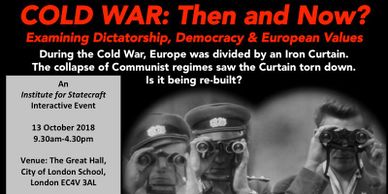Russia/Foreign policy
(Foreign policy) | |
|---|---|
| Interest of | • Eduard Abrahamyan • Duncan Allan • Nigel Gould-Davies • Mira Milosevich • James Sherr |
"Russian Propaganda"
- Full article:
 Cold War Then and Now?
Cold War Then and Now?
- Full article:
Groups such as the Institute for Statecraft" have been aggressively promoting the public perception of Russia as an enemy image and the stated purpose of the Integrity Initiative was to "counter Russian disinformation". Their activities included promotion of Russophobia and Cold War 2.0 and covert influencing of the democratic process to try to block appointments of officials whom the see as soft on Russia.
Related Quotations
| Page | Quote | Author |
|---|---|---|
| Russia | “As commentators such as Mark Galotti and Edward Lucas have long pointed out, the Putin state has long co-opted Russian criminality to act as an information source, purveyor of corruption and in supporting Russia/Foreign policy aims including murders outside Russia. However, due to difficulties to say the least in obtaining convictions or even meeting criminal standards of evidence against persons outside the jurisdiction, much information which would demonstrate these links are often limited in numbers and quality. This is especially so due to the lack of understanding of the semi militarized ethos of Russian society.” | Euan Grant |
| Russia | “Higher stakes meant aggressive mobilisation of media for an information war became a feature of 1990s electoral politics at regional level, following the pattern of the 1996 presidential election.
By then, the corruption associated with privatisation had made Yeltsin and the reformers unpopular – and many feared the communists would return to power. The democrats had to resort to desperate measures. Every possible resource was mobilised to ensure that Yeltsin was re-elected – including deals with powerful oligarchs with large media empires. The communists were defeated but the price was endemic cynicism about the democratic process. The Yeltsin presidency remained beholden to Russia’s regional governors and the oligarchs. It fell to Putin to curtail the powers of these groups, campaigning in 2000 under the slogan of “the dictatorship of law”. That such a slogan could have popular support shows the degree to which the public had become disillusioned in the late 1990s. However, the direction towards concentration of power had been set almost a decade before Putin was elected president. Russia’s reformers of the 90s largely achieved the irreversible economic change they wanted. They were less successful in creating a positive narrative for the new Russia. Reform had seemed to be based on the idea that Russia needed to learn as much as possible from the west. Over time, disillusion with this idealised view of the west grew and public opinion became more nationalistic.” | Adrian Campbell |
